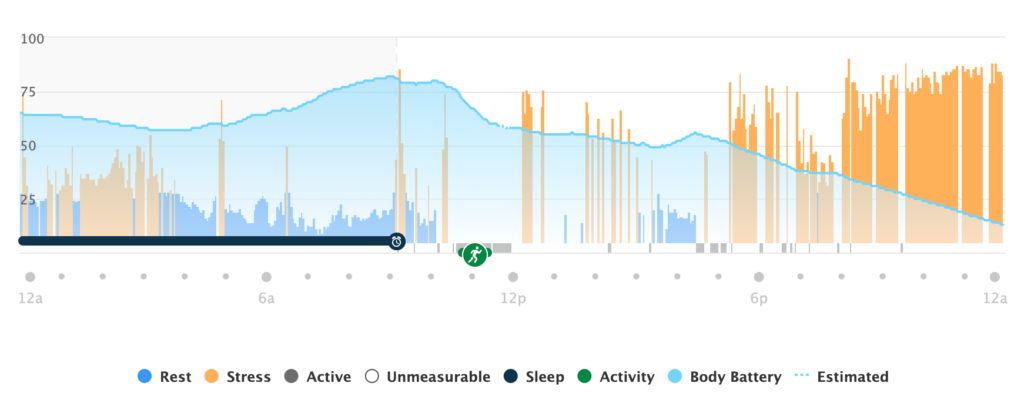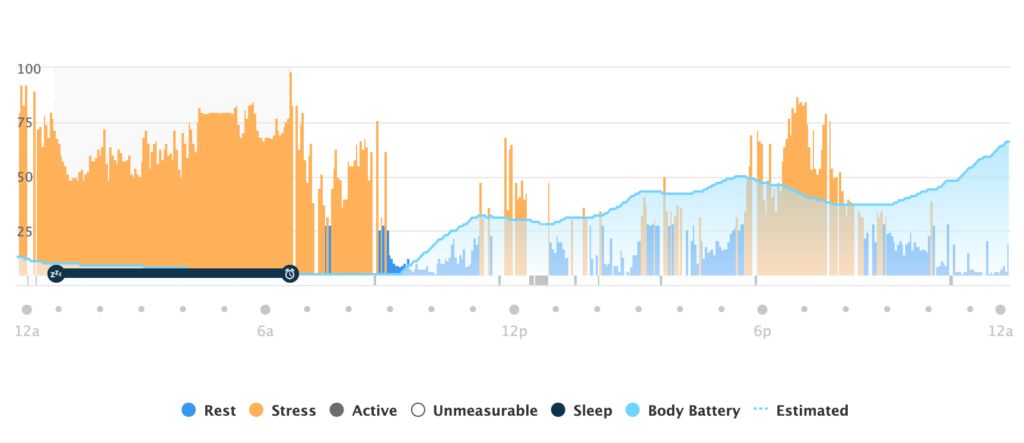One thing that can have a huge impact on your Garmin Body Battery level is drinking alcohol.
I enjoy drinking fairly often, but it’s usually a couple beers or a glass of wine. I’ve cut back a lot since my younger days, and that’s probably a good thing. But from time to time, I over indulge… as I’m sure many people do.
New Year’s Eve was one of those nights. When I woke up the next morning and my body battery had bottomed out at 5, I thought it was a perfect opportunity to illustrate the effect of heavy drinking on your body’s stress levels and your body battery.
What Is Garmin Body Battery?
You can read more about Garmin Body Battery in this article, but here’s the short version.
Newer models of Garmin watches track a bunch of different data points. One major data point is heart rate variability, which Garmin uses to approximate physiological stress on your body. When heart rate variability (HRV) is low, stress is high.
Over time, this is used to approximate your body battery. If you have a restful day without stress, you’ll be charged up and recovered. If you have a stressful day without rest, you won’t be.
Essentially, it’s a proxy for recovery. If your body is fully recovered, you should have a high body battery – and you should be prepared for a hard workout. But if your body battery is low, you’re probably not fully recovered and you might want to take it easy.
So How Does Alcohol Fit In?
Drinking alcohol results in a higher heart rate and a lower heart rate variability. This is going to impact your stress levels, as measured by your Garmin, and therefore your body battery.
Alcohol also interferes with sleep. Since sleep is just about the most important tool for recovery, anything that prevents you from getting a restful night’s sleep is almost certainly bad for your recovery.
And you can see both of these factors at play in the graphs below.

The first graph is my Garmin body battery and stress levels from December 31 – New Year’s Eve.
As you can see, I started the day out without being fully charged. There’s a stressful period during my previous night’s sleep – probably the result of a few drinks. It was vacation, after all, and the holidays is a time for a little overindulgence.
I went for a run, and you can see my body battery drop there. It was an easy five mile run, and a few hours after the run my stress levels were back to normal.
But in the evening, things take a turn. We had an early evening Zoom get together to celebrate the New Year with some friends, and that involved a few drinks.
After dinner, I sat on the couch watching a jazz concert, eating snacks, and drinking some more beer.
Throughout the whole evening, I probably had six or seven beers, a few drinks worth of rum (mixed into kremas), and a couple glasses of prosecco. That’s heavy drinking by any standards, and the resulting impact on my body is pretty clear.
By the late evening, my stress levels are high and they stay that way past midnight. My resting heart rate is usually in the 40’s, and it was elevated to about 80 by the end of the night.

But the worst part is when you look at my graph from the next day.
Those stress levels stayed elevated the entire time I was asleep. They dropped a bit after I dozed off, but when I woke up they were still high. I might have been better off if I had been able to sleep late, but I had to wake up early that morning.
For the next two hours after waking up my stress levels were still elevated. I was definitely feeling hungover and groggy.
Eventually, the stress subsided and the body battery began to recharge. But you can see throughout the day that it’s still sensitive. I didn’t go running or workout that day, but there are still plenty of spikes in my stress levels. The effect here is similar to when I’ve had a really strenuous run in the morning.
So What Does This Mean for Running?
The charts here illustrate, in a pretty stark fashion, the effect of drinking on the body.
It’s clear that alcohol had an effect on my heart rate variability and stress levels. And that effect had an impact on the quality of my sleep the next morning.
I shared this graph because it’s impossible to ignore the effect. But the point is that your Garmin watch and Garmin Body Battery can be a good way to monitor whether or not your drinking is impacting your recovery – and therefore your training.
If you have a beer or two, and you don’t notice any signs of physiological stress, then you’re good to go. But once you start noticing stress during your sleep, you’ve got a problem.
At least when it comes to training. I’m not here to talk about whether or not you have a drinking problem. You can take that up with your therapist.
